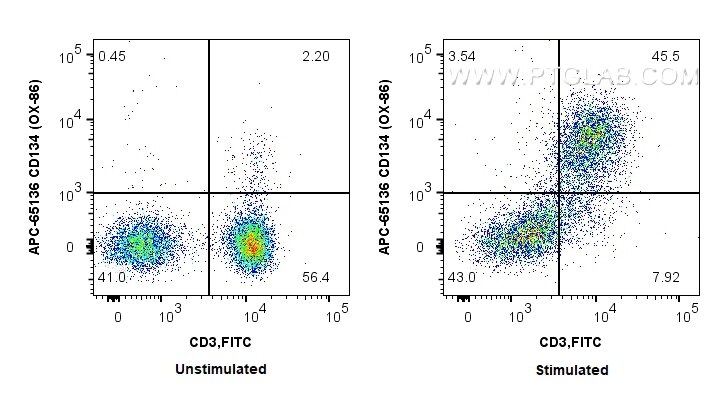Validation Data Gallery
Tested Applications
| Positive FC detected in | Anti-CD3/CD28 treated mouse splenocytes |
Recommended dilution
| Application | Dilution |
|---|---|
| Flow Cytometry (FC) | FC : 0.2 ug per 10^6 cells in 100 μl suspension |
| This reagent has been tested for flow cytometric analysis. It is recommended that this reagent should be titrated in each testing system to obtain optimal results. | |
| Sample-dependent, Check data in validation data gallery. | |
Published Applications
| FC | See 1 publications below |
Product Information
APC-65136 targets CD134/OX40 in FC applications and shows reactivity with mouse samples.
| Tested Reactivity | mouse |
| Cited Reactivity | mouse |
| Host / Isotype | Rat / IgG1, kappa |
| Class | Monoclonal |
| Type | Antibody |
| Immunogen |
Recombinant mouse OX-40-CD4 chimeric protein 相同性解析による交差性が予測される生物種 |
| Full Name | tumor necrosis factor receptor superfamily, member 4 |
| GenBank accession number | BC065782 |
| Gene Symbol | CD134 |
| Gene ID (NCBI) | 22163 |
| RRID | AB_2883017 |
| Conjugate | APC Fluorescent Dye |
| Excitation/Emission maxima wavelengths | 650 nm / 660 nm |
| Form | |
| Form | Liquid |
| Purification Method | Affinity purification |
| UNIPROT ID | P47741 |
| Storage Buffer | PBS with 0.09% sodium azide and 0.5% BSA{{ptg:BufferTemp}}7.3 |
| Storage Conditions | Store at 2-8°C. Avoid exposure to light. Stable for one year after shipment. |
Background Information
CD134, also known as OX40 and TNFRSF4, is a member of the TNFR-superfamily of receptors (PMID: 2828930; 9766631). It is a type I transmembrane protein predominantly expressed on activated T cells which include CD4 and CD8 T cells, Th2, Th1, and Th17 cells, as well as regulatory T cells (Tregs) (PMID: 20307208). CD134 is activated by its cognate ligand CD134L (OX40L) and functions as a T cell co-stimulatory molecule (PMID: 26215166). CD134-CD134L interactions have been proposed as a potential therapeutic target for treating autoimmune diseases, cancer and infectious disease (PMID: 26215166; 19426222).
Protocols
| Product Specific Protocols | |
|---|---|
| FC protocol for APC CD134/OX40 antibody APC-65136 | Download protocol |
| Standard Protocols | |
|---|---|
| Click here to view our Standard Protocols |

